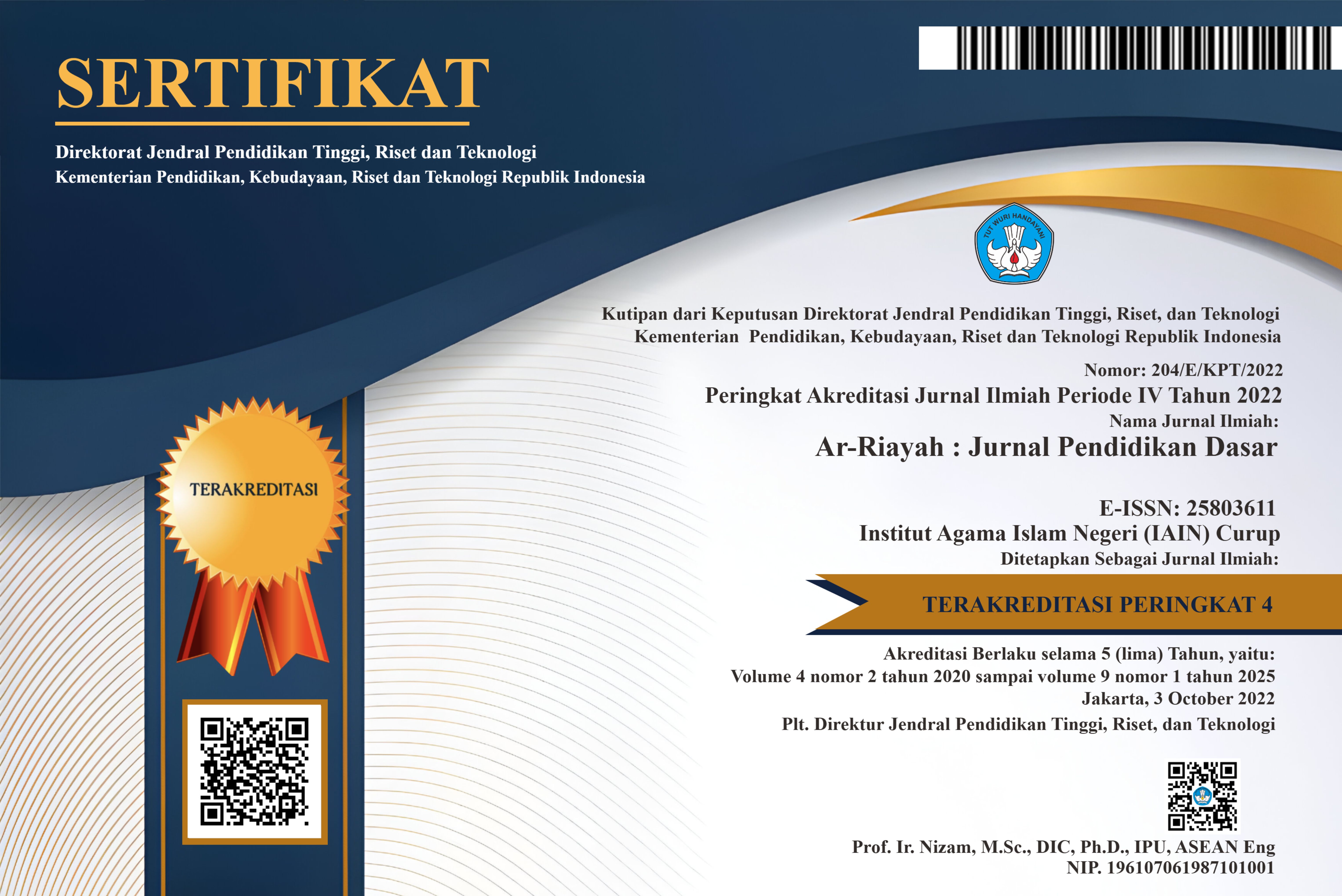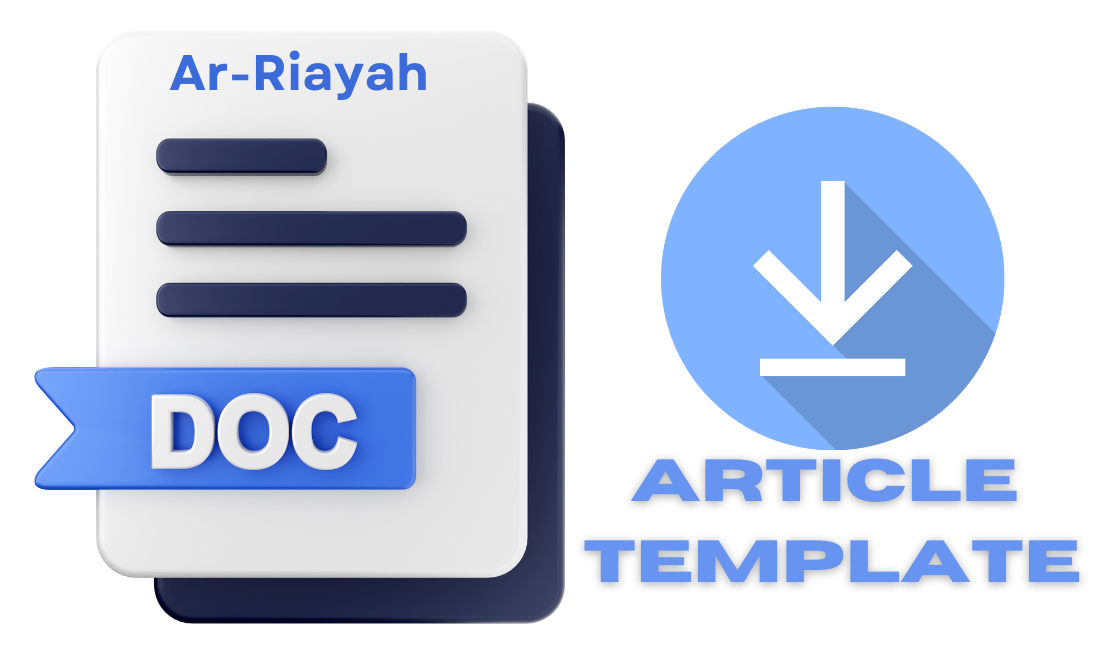Model Inkuiri Terbimbing Berbantuan Buku Dongeng Movable Berbasis Etnosains untuk Meningkatkan Literasi Sains Siswa
DOI:
https://doi.org/10.29240/jpd.v7i2.6832Keywords:
Guided Inquiry, Ethnoscience-Based Movable Story Tale Book, Scientific LiteracyAbstract
Science literacy is an essential skill that elementary school pupils need to be mastered. This study aimed to enhance the sixth-grade students' scientific literacy of SDN Cililitan 02 by implementing a guided inquiry model assisted by an ethnoscience-based movable storytale book. The Kemmis & McTaggart model was utilized in this classroom action research and carried out for 2 cycles of planning, implementation, observation, and reflection. The subjects of this research were 32 sixth-grade students of SDN Cililitan 02 in the academic year 2021-2022. Data collection techniques used in this study included observation, interviews, and tests. The results showed that applying the guided inquiry model assisted by an ethnoscience-based movable storytale book improved the sixth-grade students’ scientific literacy of SDN Cililitan 02. The average scientific literacy percentage of the students in the pre-cycle test was 41.25%. The average percentage of students who completed scientific literacy tests was 67.19% in the first cycle and grew to 85.94% in the second. Applying the guided inquiry model assisted by ethnoscience-based movable fairy tale books makes learning more contextual through scientific methods by presenting local cultural content close to students' daily lives.
Downloads
References
Ahied, M., L. K. Muharrami, A. Fikriyah, and I. Rosidi. “Improving Students’ Scientific Literacy through Distance Learning with Augmented Reality-Based Multimedia amid the Covid-19 Pandemic.†Jurnal Pendidikan IPA Indonesia 9, no. 4 (2020): 499–511. https://doi.org/10.15294/jpii.v9i4.26123.
Aktekin, Nafiye Cigdem. “Critical Friends Group (CFG): Inquiry-Based Professional Development Model for Turkish EFL Teachers.†Eurasian Journal of Educational Research 2019, no. 81 (2019): 1–20. https://doi.org/10.14689/ejer.2019.81.1.
Ardiningtyas, Devia, and Budi Jatmiko. “Peningkatan Literasi Sains Siswa Sma Melalui Penerapan Model Pembelajaran Inkuiri Terbimbing Dan Model Pembelajaran Berdasarkan Masalah.†Inovasi Pendidikan Fisika 08, no. 3 (2019): 846–50. https://jurnalmahasiswa.unesa.ac.id/index.php/inovasi-pendidikan-fisika/article/view/29431.
Chang, Yuwen. “Science Motivation Across Asian Countries: Links among Future-Oriented Motivation, Self-Efficacy, Task Values, and Achievement Outcomes.†Asia-Pacific Education Researcher 24, no. 1 (2015): 247–58. https://doi.org/10.1007/s40299-014-0176-3.
Dewi Muliani, Ni Kt., and I Md. Citra Wibawa. “Pengaruh Model Pembelajaran Inkuiri Terbimbing Berbantuan Video Terhadap Hasil Belajar IPA.†Jurnal Ilmiah Sekolah Dasar 3, no. 1 (2019): 107. https://doi.org/10.23887/jisd.v3i1.17664.
Fa’idah, Ranti Nur, Supriyono Koes H, and Susriyati Mahanal. “Pengaruh Model Pembelajaran Inkuiri Terbimbing Terhadap Literasi Sains Siswa Kelas V SD.†Jurnal Pendidikan: Teori, Penelitian, Dan Pengembangan 4, no. 12 (2019): 1704. https://doi.org/10.17977/jptpp.v4i12.13096.
Faisal, and Sonya N. Martin. “Science Education in Indonesia: Past, Present, and Future.†Asia-Pacific Science Education 5, no. 1 (2019): 1–29. https://doi.org/10.1186/s41029-019-0032-0.
Fasce, Angelo, and Alfonso Picó. “Science as a Vaccine: The Relation between Scientific Literacy and Unwarranted Beliefs.†Science and Education 28, no. 1–2 (2019): 109–25. https://doi.org/10.1007/s11191-018-00022-0.
Fitri, Isni, and Yuni Fatisa. “Penerapan Model Pembelajaran Inkuiri Terbimbing Untuk Mendukung Kemampuan Literasi Sains Siswa Pada Materi Sistem Koloid.†Journal of Natural Science and Integration 2, no. 2 (2019): 60. https://doi.org/10.24014/jnsi.v2i2.7888.
Gunawan, Ahmad Harjono, Hermansyah, and Lovy Herayanti. “Guided Inquiry Model through Virtual Laboratory to Enhance Students’ Science Process Skills on Heat Concept.†Cakrawala Pendidikan 38, no. 2 (2019): 259–68. https://doi.org/10.21831/cp.v38i2.23345.
Haryanto, Abu Bakar, and Aulia Sanova. “Guided Inquiry: How To Improve Scientific Literacy Student Senior High School.†Humanities & Social Sciences Reviews 8, no. 4 (2020): 720–27. https://doi.org/10.18510/hssr.2020.8471.
Heliawati, Leny, Bibin Rubini, and Rudi Firmayanto. “The Effectiveness of Content and Language Integrated Learning-Based Teaching Material in the Topic of the Nature of Matter on Scientific Literacy.†Journal for the Education of Gifted Young Scientists 8, no. 3 (2020): 1061–70. https://doi.org/10.17478/JEGYS.736654.
Lestari, Hana, and Ima Rahmawati. “Integrated STEM through Project Based Learning and Guided Inquiry on Scientific Literacy Abilities in Terms of Self-Efficacy Levels.†Al Ibtida: Jurnal Pendidikan Guru MI 7, no. 1 (2020): 19. https://doi.org/10.24235/al.ibtida.snj.v7i1.5883.
Mar’ah, Nur khairiyatul, Ani Rusilowati, and Eko Purwanti. “Development of Science Literature Instruments Contained Ethnoscience in Science Subject for Class IV Elementary School Students.†International Journal of Research and Review 8, no. 9 (2021): 423–35. https://doi.org/10.52403/ijrr.20210954.
Margunayasa, I. Gede, Nyoman Dantes, A. A.I.N. Marhaeni, and I. Wayan Suastra. “The Effect of Guided Inquiry Learning and Cognitive Style on Science Learning Achievement.†International Journal of Instruction 12, no. 1 (2019): 737–50. https://doi.org/10.29333/iji.2019.12147a.
Muyassaroh, Izzah, and Nur Luthfi Rizqa Herianingtyas. “Enhancing Elementary Preservice Teachers ’ Scientific Literacy by Using Flipped Problem-Based Learning Integrated with E-Campus.†Jurnal Pendidikan : Teori, Penelitian, Dan Pengembangan 8, no. 2 (2023): 1–12.
Muyassaroh, Izzah, and Deti Nurpadilah. “Implementasi Problem Based Learning Dengan Pendekatan Saintifik Dalam Peningkatan Kemampuan Berpikir Kritis Siswa Kelas IV SD.†Dikoda: Jurnal Pendidikan Sekolah Dasar 2, no. 2 (2021): 23–31. https://jurnal.pelitabangsa.ac.id/index.php/JPGSD/article/view/994.
Muyassaroh, Izzah, and Siti Partini Suadiman. “Pengembangan Buku Dongeng Movable Berbasis Etnosains Untuk Meningkatkan Literasi Sains Dan Karakter Cinta Tanah Air Siswa Kelas IV SD Di Kota Yogyakarta.†Master’s Thesis, Yogyakarta State University, 2018. https://eprints.uny.ac.id.
Muyassaroh, Izzah, and Titin Sunaryati. “Urgensi Pengembangan Buku Dongeng Movable Berbasis Etnosains Sebagai Bahan Ajar Penunjang Pembelajaran IPA Siswa Kelas.†AR-RIAYAH : Jurnal Pendidikan Dasar 5, no. 1 (2021): 13. https://doi.org/10.29240/jpd.v5i1.2683.
Nasir, Muh., Muhamadiah Muhamadiah, Sulistia Indah, and Irham Irham. “Literasi Sains Siswa Melalui Model Pembelajaran Inkuiri Terbimbing.†JIIP - Jurnal Ilmiah Ilmu Pendidikan 6, no. 1 (2023): 324–28. https://doi.org/10.54371/jiip.v6i1.1425.
OECD. PISA 2018 Results. OECD Publishing, 2019. https://doi.org/10.1787/g222d18af-en.
———. “Programme for International Student Assessment (PISA) Results from PISA 2018.†Oecd, 2019, 1–10. https://www.oecd-ilibrary.org/education/pisa-2018-results-volume-iii_bd69f805-en%0Ahttps://www.oecd-ilibrary.org//sites/bd69f805-en/index.html?itemId=/content/component/bd69f805-en#fig86.
Pearson, P. David, Elizabeth Moje, and Cynthia Greenleaf. “Literacy and Science: Each in the Service of the Other.†Science 328, no. 5977 (2010): 459–63. https://doi.org/10.1126/science.1182595.
Queiruga-Dios, Miguel Ãngel, Emilia López-Iñesta, MarÃa Diez-Ojeda, MarÃa Consuelo Sáiz-Manzanares, and José Benito Vázquez DorrÃo. “Citizen Science for Scientific Literacy and the Attainment of Sustainable Development Goals in Formal Education.†Sustainability (Switzerland) 12, no. 10 (2020): 1–18. https://doi.org/10.3390/su12104283.
Ratini, H. Muchtar, M. A. Suparman, A. H. Tamuri, and E. Susanto. “The Influence of Learning Models and Learning Reliance on Students’ Scientific Literacy.†Jurnal Pendidikan IPA Indonesia 7, no. 4 (2018): 458–66. https://doi.org/10.15294/jpii.v7i4.12489.
Ristanto, Rizhal Hendi, Siti Zubaidah, Mohamad Amin, and Fatchur Rohman. “Scientific Literacy of Students Learned Through Guided Inquiry.†International Journal of Research and Review 2, no. 6 (2017): 343–47.
Rusilowati, Ani, Lina Kurniawati, Sunyoto E. Nugroho, and Arif Widiyatmoko. “Developing an Instrument of Scientific Literacy Asessment on the Cycle Theme.†International Journal of Environmental and Science Education 11, no. 12 (2016): 5718–27.
Sirait, Maruslin. “Model Pembelajaran Berbasis Discovery- Inkuiri Dan Kontribusinya Terhadap Penguatan Kualitas Pembelajaran Di Sekolah Dasar.†AR-RIAYAH : Jurnal Pendidikan Dasar 1, no. 2 (2017): 155. https://doi.org/10.29240/jpd.v1i2.320.
Subali, Bambang. “Implementation of Ethnoscience-Based Guided Inquiry Learning on The Scientific Literacy and The Character of Elementary School Students.†Journal of Primary Education 8, no. 5 (2019): 139–47.
Turiman, Punia, Jizah Omar, Adzliana Mohd Daud, and Kamisah Osman. “Fostering the 21st Century Skills through Scientific Literacy and Science Process Skills.†Procedia - Social and Behavioral Sciences 59 (2012): 110–16. https://doi.org/10.1016/j.sbspro.2012.09.253.
Wang, Yan, Jari Lavonen, and Kirsi Tirri. “An Assessment of How Scientific Literacy-Related Aims Are Actualised in the National Primary Science Curricula in China and Finland.†International Journal of Science Education 41, no. 11 (2019): 1435–56. https://doi.org/10.1080/09500693.2019.1612120.
Winarni, Endang Widi, and Endina Putri Purwandari. “Project-Based Learning to Improve Scientific Literacy for Primary Education Postgraduate Students in Science Subject.†Jurnal Prima Edukasia 8, no. 1 (2020): 67–77. https://doi.org/10.21831/jpe.v8i1.30618.
Winata, Anggun, Sri Cacik, and Ifa Seftia. “Analisis Kemampuan Awal Literasi Sains Mahasiswa Pada Konsep IPA.†Education and Human Development Journal, Vol. 01. No. 01, September 2016 01, no. 01 (2016): 34–39.
Downloads
Published
How to Cite
Issue
Section
Citation Check
License
Authors who publish with Ar-Riayah: Jurnal Pendidikan Dasar agree to the following terms:
Authors retain copyright and grant the journal right of first publication with the work simultaneously licensed under a Creative Commons Attribution-NonCommercial-ShareAlike 4.0 International License (CC BY-NC-SA 4.0) that allows others to share the work with an acknowledgment of the work's authorship and initial publication in this journal.
Authors are able to enter into separate, additional contractual arrangements for the non-exclusive distribution of the journal's published version of the work (e.g., post it to an institutional repository or publish it in a book), with an acknowledgment of its initial publication in this journal.
- Authors are permitted and encouraged to post their work online (e.g., in institutional repositories or on their website) prior to and during the submission process, as it can lead to productive exchanges, as well as earlier and greater citation of published work (See The Effect of Open Access).










